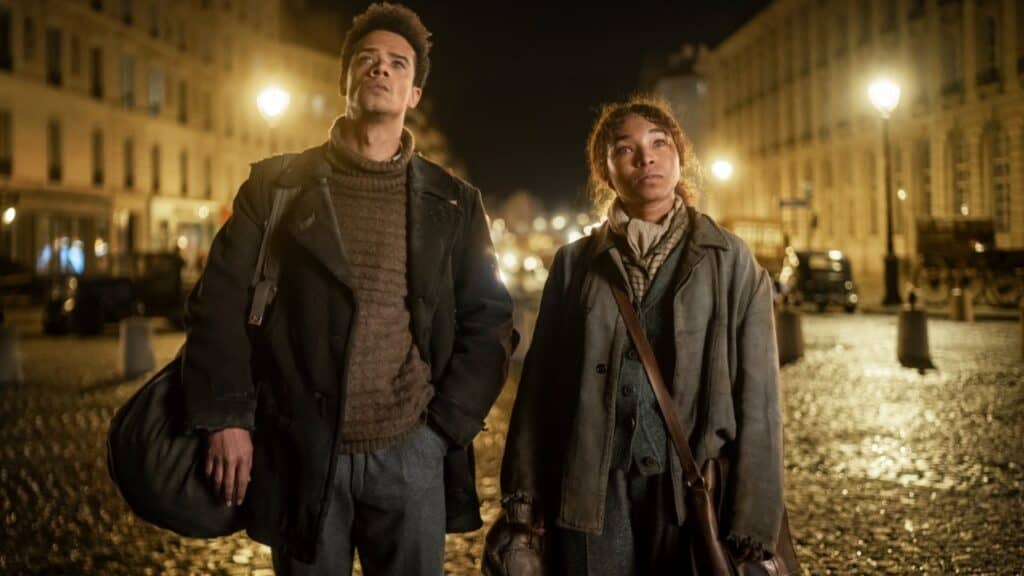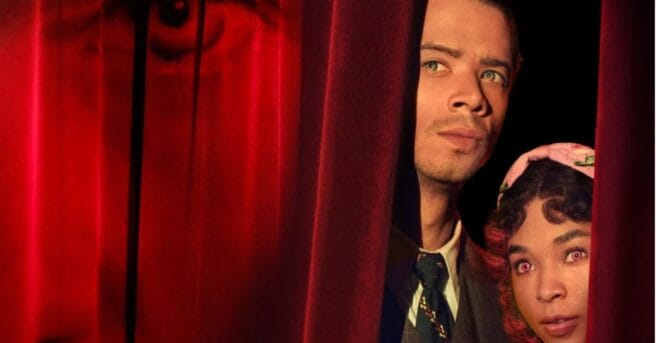Last Updated on June 3, 2024

Plot: As Louis and Claudia escape to Paris after killing Lestat, and are ready to embark on new relationships in the new city. But they find themselves in a world influenced by Lestat, especially when they join the Theatre de Vampires, a performing group found by Lestat.
Review: Timed perfectly to Halloween, the 2022 debut of Interview with the Vampire beautifully updated the first volume in Anne Rice‘s vast series for a new generation. With a young cast and a more overt take on the homoerotic elements of the novels, AMC’s series was designed to kickstart a cinematic universe of adaptations from the author’s works. While Mayfair Witches did not work as well, the second season of Interview with the Vampire is a welcome return to the stories of Louis, Claudia, Lestat, and more. Billed as “Part II,” the second season chronicles the back half of Rice’s novel. Expanding on subplots and deepening the characters of Armand and Santiago, this eight-episode season completes the adaptation of the source material in a far more satisfying way than the feature film did while setting a path towards future seasons taking on the subsequent books in The Vampire Chronicles.
The first season of Interview with the Vampire concludes with the reveal that Louis’ (Jacob Anderson) manservant Rashid (Assad Zaman) is the vampire Armand. Played in the feature film by Antonio Banderas, this take on Armand is far more subtle and shares a deeper connection with Louis as the film portrayed. It also puts the focus of this season on the Parisian acting troupe, Les Theatre Dus Vampires, at the center of the narrative. The troupe, a two-century-old coven of vampires, is led by Armand and lead actor Santiago. Played by Ben Daniels in the role originated by Stephen Rea in the 1994 film, Santiago is the season’s main antagonist and serves as a surrogate for Lestat’s presence. But that does not mean Lestat is not present in this run of episodes. An ever-present specter in flashbacks and physically embodied by Sam Reid in dream sequences and voice-overs, Lestat is still a formidable part of Louis and Claudia’s journey despite the relationship between Louis and Armand being at the forefront of these chapters.
The biggest change between the first season and Part II is the departure of Bailey Bass as Claudia. Now played by Delainey Hayles, something announced by a title card before the first episode like a change in a stage production, Claudia’s arc is far more detailed than in the movie. While Kirsten Dunst’s performance was exceptional, Hayles plays Claudia as a maturing woman trapped in a child’s body. The physical resemblance between Bass and Hayles helps to keep the character consistent. Still, Hayles adds a layer to her performance that accentuates the loneliness and desire beneath the surface. The fate of Claudia as part of Louis’ tale was protracted in the movie but a centerpiece of this run of episodes. Claudia’s relationship with Madeleine (Roxane Duran) is less of a desire for a mother as it was in Neil Jordan’s film and now more of a partner to spend her eternal life with. The dynamic between Louis and Claudia shifts this season with the younger vampire feeling at home with the theater troupe, something being alone with Louis never gave her.

The other expansion, as compared to the film version, is the contemporary story featuring Armand and Louis regaling reports to Daniel Molloy (Eric Bogosian) with their history. In this series, Louis first told his story to Molloy in 1973 and returns for added details in the modern day. Having Armand and Louis share their story with Molloy offers conflicting perspectives and adds layers to the connection between the three men. The fact that Molloy suffers from Parkinson’s is also key to the narrative, and his reluctance to trust the vampires after the end of season one adds to the tension of where this story is headed. This season also adds to the Order of the Talamasca, a secret society investigating vampires and witches, with Justin Kirk serving as their representative. The Talamasca were a key figure in the first season of Mayfair Witches and are designed as a connective element for the shared Immortal Universe that AMC has planned. Their appearance in this series is limited but hopefully pans out as more than a forced connection.
The modernization of Interview with the Vampire from the late 18th century to taking place in the early 1900s and modern day helps energize the narrative. The Part II shift from New Orleans to Paris also affords a deeper look at how European culture was more inviting to minorities regarding race and sexuality. Set in the wartime era, the inclusion of Nazi influences serves as a mirror for the persecution that is a key theme in this tale. These elements are built organically into the story over the first six episodes made available for this review. Returning writers, led by Hannah Moscovitch and Rolin Jones, manage to expand this story in wonderful ways while directors Craig Zisk, Levan Akin, and more leverage the Old World aesthetics of Paris to drench this series in atmosphere. The consistency between the two seasons of Interview With The Vampire is impressive, especially considering how dramatically different the geographic settings of the halves of the story are.
Having not seen the final two episodes of the season, I know exactly where they are headed, having read the novel and seen the feature film. I am excited and terrified to see how the creative team handles the ending of this story, which is already shaping up to be very different from what has come before. Interview With The Vampire deserves the Part II subtitle rather than being saddled with being a second season. This is the rest of the story started in those first seven episodes and is shaping up to be one of the best adaptations of any novel for the small screen. With exceptional performances and expansions on Anne Rice’s source material that the author herself would have loved, Interview with the Vampire is once again one of the best series on television. Whether this dovetails into an adaptation of The Vampire Lestat or forges an original path for a third season, this is must-see programming that fans of the first season and newcomers alike will love.
Anne Rice’s Interview with the Vampire Part II premieres on May 12th on AMC.





















Follow the JOBLO MOVIE NETWORK
Follow us on YOUTUBE
Follow ARROW IN THE HEAD
Follow AITH on YOUTUBE